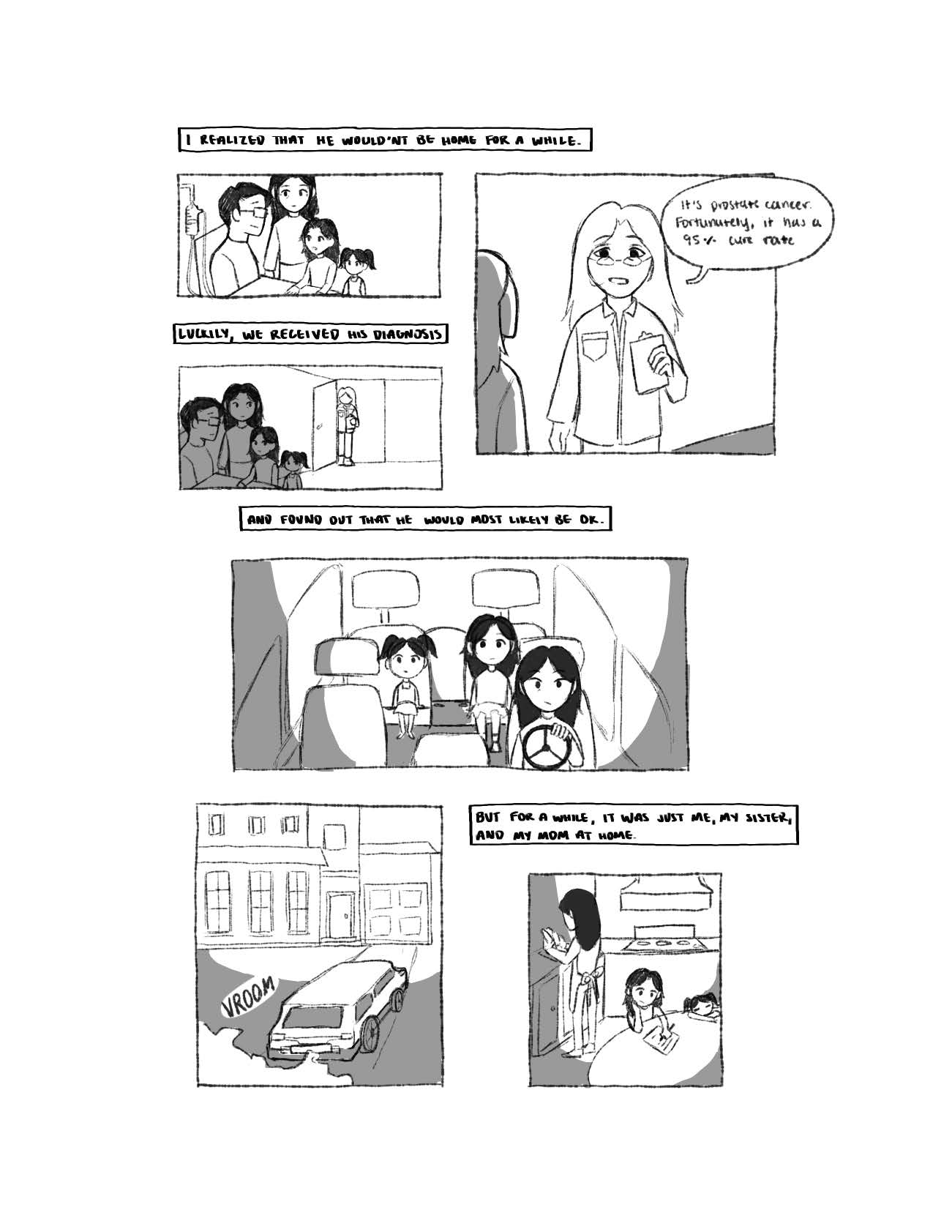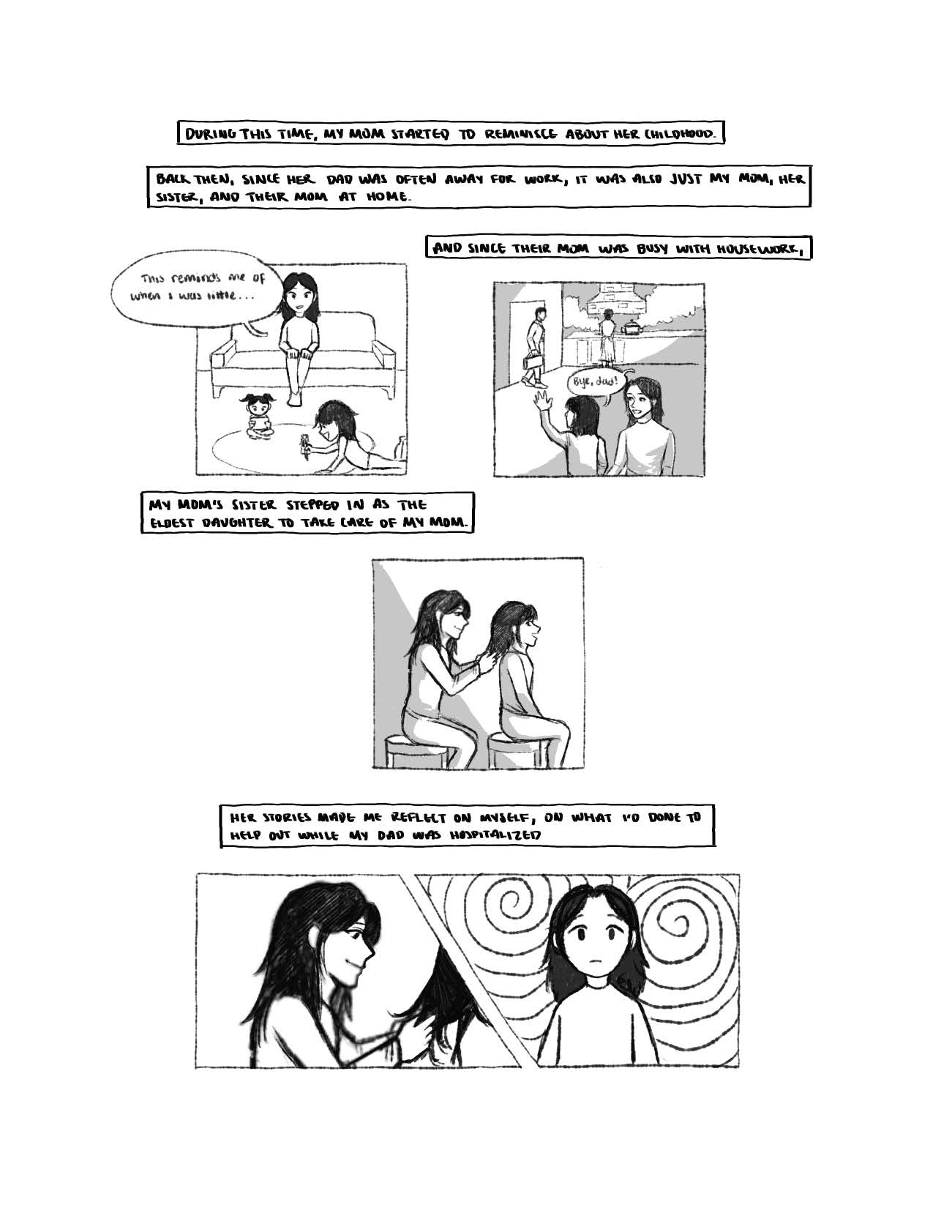A Tumble Down the Stairs
Jiayi Zhang
Instructor’s Introduction
Graphic memoirs–personal stories in the form of comics–create powerful narratives through the juxtaposition of text and image. In WR120: The Graphic Memoir, we study examples of this form that explore challenging subjects including American racism, childhood neglect, medical trauma, homophobia, and suicide. After the class has formed a community through courageous discussions of published graphic memoirs, students write their own.
Jiayi Zhang’s memoir, “A Tumble Down the Stairs,” tells of Jiayi’s evolution from a childish state that she describes as “selfish” into being a caring and responsible member of her family. Interestingly, this shift occurs not when her parents scold her directly, but rather when Jiayi is captivated by her mother’s stories of growing up in pre-industrialized China. She is so moved by her mother’s past that she silently commits to taking on more responsibility, especially in caring for her younger sister. Jiayi’s memoir works similarly on its readers: while she does not tell us directly to change our behavior, her skillful storytelling (a masterclass in panel layout and pacing) forges a narrative empathy that challenges us to reflect on our ourselves. The artist statement highlights how Jiayi’s private commitment to change had a powerful effect on those around her, reminding us of the ways storytelling can both transform and connect us.
Jessica Kent
From the Writer
As someone who’d always hovered over the line of whether to pursue art or science and ultimately went with the latter, WR120 was an opportunity to express a story through which I could employ both literary and artistic techniques; ultimately, I had a rather simple goal: to write a narrative that pushed forward a message I strongly believed in, and to make it a hopefully enjoyable read.
Most of my inspiration came from a place that I knew many people would relate to: a place where one realizes their own faults in a situation that presents them with the opportunity for growth; a place where one feels the sour taste of their own selfishness or immaturity, but also the pride when they finally strive to do better. I wanted to share a time in my life where everything went downhill, and it took more than just a few pushes to help me realize my own immaturity and begin to build a way back up.
A Tumble Down the Stairs
Artist Statement
The idea for this memoir first sprouted a few weeks into college.
Before leaving for what would be the longest time away from home I’d ever experienced (so far), I had promised my parents, specifically my mom, that I would call every night. And while I tried to keep the phone calls consistent, it was inevitable that the steadiness would fluctuate as I got busier with my coursework. I remember one night I was on the phone with my mom, and she was nagging me to call more often. To me, a rather independent person, calling every day seemed unnecessary, so I wasn’t paying my full attention: I was half listening, half doing an assignment for class. My mom has always been more family-oriented– doing things together, talking things out, etc. In that aspect, we clashed, as I was more often than not holed up in my room and she was constantly trying to drag me out to spend time “as a family.”
She was talking about the importance of familial relationships, and I was agreeing just to move on in conversation. Eventually, she started talking about her childhood; she’s always been nostalgic, so long tangents where she reminisced were nothing out of the ordinary. My mom lived in pre-industrialized China (the period before China’s open-door policy), where technology was extremely limited and not so easily accessible to the public. As a result, most of her childhood was spent outdoors, and most of her life was centered around her family. She was particularly close with her older sister, who took care of her during the times her parents were busy. And since her dad was often out of town due to work, and her mom was balancing her own job with housework, my mom and her sister spent the majority of their childhood side by side.
My mom’s sister, as the eldest, would take on the responsibility of caring for my mother, doing things like washing her hair, fending for her in school, and doing laundry (which, in pre-industrialized China, was much more difficult than just putting clothes in a machine). They grew up extremely close, and, years later, when my mom gave birth to me and my sister, she was excited for the prospect of her own children sharing such a relationship.
At this point in the phone call, I was paying closer attention (I love hearing my mom’s stories– since I was little, I’ve always begged her to tell me more) and was asking her questions about what her life was like. We somehow got to the topic of her life in America, after she married my dad and had me. She revealed how stressed she’d felt at that time, with my dad in the hospital due to cancer and my sister at the most dependent age. She told me how glad she was that I’d stepped up back then to help her, and how significant that sudden growth of maturity was to her. Her words were surprising to me. I had not realized how she’d perceived that change in me. Back then, the step that I took to assume a more responsible role as an older sister was a change that I’d taken on personally. I didn’t realize how momentous it was to my mom. But, as I listened to her voice rise in pride and appreciation for my past self, it occurred to me just how much I’d taken a burden off of her shoulders.
I’m proud of the younger me and the steps she took to mature into the person I am today. I’m glad that she realized her faults and put an effort into changing them. That modesty is something that I’d promised myself to forever keep in touch with; while pride and confidence are important, reflection holds the essence of true personal growth.
One more thing: though I didn’t include this much in my memoir, my bond with my younger sister was strengthened and fortified during this period. Inevitably, we grew inseparable, as we spent every second of our lives side by side. Growing up with a sister I confided everything in helped me immensely during periods of instability or hardship. I’m extremely grateful to her for being my emotional and mental (and sometimes physical, when she grew taller) support.
Ultimately, this memoir is a tribute to a period of my life where the meaning of family was redefined through a lens that I never knew existed. So I guess this afterword is a final thank you, for my mom’s fascinating, never-ending stories, my dad’s unfaltering support, and my sister’s tumble down the stairs that started it all.
Jiayi Zhang is a freshman studying biomedical engineering at Boston University. She is originally from St. Louis, Missouri, and lives with her close-knit family of four. As the oldest of two sisters, she has grown to understand firsthand the pressure of responsibility and maturity for big siblings, and how essential those qualities are to a parent. She would like to extend her gratitude to her parents, of course, for their unwavering support, her sister, for her uplifting spirit, and her WR120 professor, Jessica Kent, for providing so many inspiring ideas.







